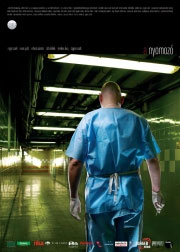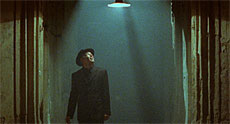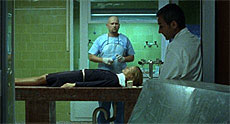 A nyomozó
A nyomozó
Hungary, 2008, colour, 110 mins
By some distance the most enjoyable new Hungarian film I’ve seen this year, Attila Gigor’s feature debut owes a huge amount to traditional noir-styled murder mysteries, but gives all the familiar ingredients a genuinely original spin – while injecting plenty of deliciously dry black comedy into the mix.
The surprises begin from the start, when the attractive blonde woman from the opening scene rapidly ends up on a mortuary slab, and the bald, warty man with a twitchy eye who’s cutting her up, sewing her back together and painstakingly applying make-up turns out to be the film’s hilariously taciturn protagonist. He’s 37-year-old Tibor Malkáv (Zsolt Anger, superb), who runs his life according to a few simple principles, and whose only truly meaningful relationship is with his mother, dying of cancer in the local hospital (and sharing a room with an equally elderly woman, her Playstation Portable and a vocabulary that would make a sailor’s parrot blanch – Gigor has a particular knack for creating memorable minor characters).

In Edit (Judit Rezes), Tibi has a girlfriend of sorts, but their relationship is restricted almost exclusively to cinema visits, and is conducted at such a low temperature as to make one of the romances in Aki Kaurismäki’s films look like torrid Latin passion. Gigor has great fun parodying various types of commercial and arthouse film – his budget was presumably too low for him to stage anything on camera, but he persuaded major Hungarian stars like Sándor Csányi to lend their voices to the inane drivel peppering their soundtracks, and there’s another perfect character sketch in the bored cinema cashier (Lilla Sárosdi) who reels off the complex co-production circumstances of the dreadful sounding Polish-Korean gore film to which Tibi subjects Edit with a certain amount of deadpan relish.
The narrative proper starts when Tibi is approached by a one-eyed man tastefully named Cyclops (Zsolt Zágoni), and offered a substantial sum of money (enough to pay for a pioneering Swedish cancer treatment for his mother) to kill someone. Tibi neither knows nor cares about the victim, and is happy to carry out the task: he presumably doesn’t regard it as any different from the accidents that led his various ‘clients’ to their final resting place on his slab (falling through a high window, crushing their windpipe with a barbell, climbing into the zoo’s wolf enclosure). It’s only when he gets a letter from his victim, one Ferenc Szirmai (Sándor Terhes), clearly posted just before the murder was committed, that he realises that they are in fact intimately connected…

This sets in train the investigation alluded to by the title – the twist being that instead of trying to establish the murderer’s identity, the murderer himself is probing the victim’s background and trying to work out the motives behind the assassination. On a straightforward thriller level, much of the film reminded me of the psychological journey undertaken by the hapless amnesiac protagonist of Dejan Zečević’s near-contemporaneous The Fourth Man (Četvrti čovjek, 2007), with the crucial difference that Tibi has perfect recall of all the details to which he is already privy.
But Zečević’s film was played with a largely straight face, whereas most of The Investigator‘s best moments come from Gigor’s typically skewed, often flat-out surreal perspective. Tibi’s dreams are invaded by talking crabs (there’s a Hungarian pun at work here: the word for ‘crab’ is the same as that for ‘cancer’, which is just about translatable into English in zodiacal terms), the pivotal letter is depicted as though the text was printed on the floor, on which the already dead Szirmai is chatting to Tibi (a particularly clever dramatic touch, as it establishes the identity of Tibi’s victim without having to spell it out), and a sequence in which all the major characters spell out their various motivations recalls the classic Agatha Christie dénouement, only with the differences that Tibi is a passive listener, not a Poirot-like master of ceremonies, and it’s all taking place in his head.

Though the film eventually buckles under the weight of its increasingly elaborate narrative (whose climax feels a little too pat to be truly convincing), there are more than enough signs that Gigor could develop into a genuinely distinctive talent. In its drolly solemnised feeling for the absurd, much of The Investigator reminded me of the early work of the Coen Brothers (especially Blood Simple and Barton Fink), and Gigor shows a similarly precocious confidence with plotting, dialogue, characterisation, direction of actors and effective use of a clearly limited budget. I’ll certainly be keeping an eye out for his next feature.
- Director/Script: Attila Gigor
- Camera: Máté Herbai
- Production Design: Sandra Stevanovity
- Editing: Zoltán Kovács
- Sound: Zoltán Tóth, Attila Tőzsér, Csaba Major, Christian Holm
- Costumes: Beáta Hoffmann
- Music: László Melis
- Producer: Ferenc Pusztai
- Production Company: KMH Film
- Cast: Zsolt Anger (Tibor Malkáv), Judit Rezes (Edit), Sándor Terhes (Ferenc Szirmai), Ildikó Tóth (Mrs. Szirmai), Éva Kerekes (Ágnes Noszfer), Zsolt Zágoni (Cyclops)
As a footnote, I should mention that I saw this at London’s Hungarian Cultural Centre as part of its regular Film Club, hosted by László Heckenast (who did such a stunning job interpreting Miklós Jancsó at the Curzon event earlier this year). Uncomfortable seats and DVD projection were more than compensated by free admission and drinks and the very welcome presence of Attila Gigor himself, who gave us a lively Q&A afterwards. The next Film Club screening is Róbert Alföldi’s Tranquillity (Nyugalom, 2008) on Thursday 4 December, and admission is also free – you just need to RSVP in advance on 020 7240 6162 or press@hungary.org.uk.
Links
- Trailer (with English subtitles).
- Two different trailers (no subtitles).
- Filmunio.hu
- Internet Movie Database
- Reviews: Variety (Eddie Cockrell); The Hollywood Reporter (Ray Bennett)
- Interview with Attila Gigor, from Hungarianfilm.com (10 January 2008)